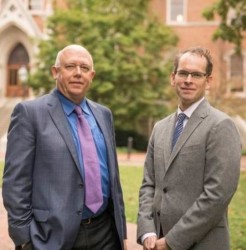See full results and methodology at vu.edu/poll.
Recent polling by Vanderbilt University shows increasing concerns from Nashville residents about the city’s explosive growth.
Poll results indicate a growing number of residents think the city is no longer “on the right track,” and that the city is growing too quickly.
These are just some of the key findings from the 2019 Vanderbilt Poll-Nashville, a nonpartisan public opinion research project conducted annually by Vanderbilt’s Center for the Study of Democratic Institutions (CSDI). Interviews with 910 residents age 18 and older were conducted March 5-April 3 on a range of topics.

Despite the concerns about Nashville’s growing pains, 66 percent of those surveyed said they approve of the job Mayor David Briley is doing.
“It will be interesting to see how this overall narrative that we are seeing – that increasing numbers of residents are concerned about the city’s growing pains – will play out in the upcoming mayoral election,” said CSDI co-director John Geer, Gertrude Conaway Professor of Political Science and dean of the College of Arts and Science. “Most of the residents polled approved of the job Mayor Briley is doing, yet we found increasing worry about the direction of our city. This context could be challenging for an incumbent in the upcoming election.”
Concerns about Nashville’s future
Since the poll’s inception in 2015, the percentage of residents who think the city is moving in the wrong direction has grown from 22 percent to 45 percent today. Conversely, those who think Nashville is moving in the right direction has dropped from 72 percent in 2015 to 53 percent in this latest poll.
Responses to questions about issues directly related to growth – population, new construction and attracting more businesses to the Nashville area – indicate residents are uncomfortable with the pace of growth and with using taxpayer-funded incentives to lure corporations. The results show:
- 78 percent of respondents think Nashville’s population is growing too quickly.
- 64 percent think the construction of new buildings and properties is growing too quickly.
- 74 percent would rather see taxpayer money spent on something other than tax incentives to keep or attract businesses to the city.
“There are a number of pain points that accompany growth – whether it be a decrease in affordable housing, increased traffic or construction detours.”
“It’s interesting, but perhaps not unexpected, that we continue to see a decline in optimism about the city’s future, despite Nashville’s rise in a number of the key economic measures,” said Josh Clinton, co-director of the CSDI and Abby and Jon Winkelreid Professor of Political Science. “There are a number of pain points that accompany growth – whether it be a decrease in affordable housing, increased traffic or construction detours. We are also likely seeing the ‘Amazon effect’ in the responses to the question about the use of taxpayer funds to keep or attract big business to the city.”
Economy
Despite some clouds on the horizon, residents continue to feel confident about Nashville’s economy – with 32 percent rating it “very good,” and 50 percent rating it “fairly good.”
When asked about priorities for the Nashville mayor and the Metro Nashville government, 65 percent of residents indicated that taking steps to ensure the city’s long-term financial health should be a top priority.
Education
Recent controversy around Nashville’s public schools is likely reflected in respondents’ views about the job performance of the school board and the schools director, Geer said.
Last year, 51 percent of residents said they approve of the job the school board is doing, compared with 37 percent today. Those who disapprove jumped from 30 percent last year to 52 percent in this year’s poll.
Outgoing schools director Shawn Joseph’s handling of the job also drew more criticism. The percentage of those who approve of his performance dropped to 33 percent, down from 46 percent the previous year. Those who disapprove rose from 25 percent in 2018 to 54 percent this year.
However, despite their views of Metro Schools’ leadership, 67 percent of residents surveyed said they would support an increase in property taxes if the increase were to go toward increasing the pay of teachers.
About the Vanderbilt Poll
The Vanderbilt Poll is supported by the Center for the Study of Democratic Institutions at Vanderbilt University. The statewide poll is typically conducted just before the start of each legislative session and at the end of each session, in part to determine how closely the results of the session align with voters’ expectations and priorities. CSDI also conducts a yearly Nashville poll, as well as additional special polls. In 2015, the Vanderbilt Poll became a charter member of the American Association for Public Opinion Research’s Transparency Initiative.